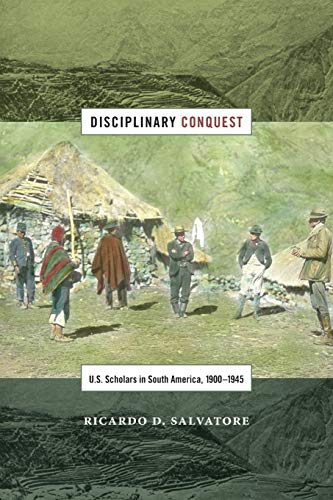All books / Book
Disciplinary Conquest: U.S. Scholars in South America, 1900–1945 (American Encounters/Global Interactions)

| Full title: | Disciplinary Conquest: U.S. Scholars in South America, 1900–1945 (American Encounters/Global Interactions) |
|---|---|
| ISBN: | 9780822360957 |
| ISBN 10: | 0822360950 |
| Authors: | Salvatore, Ricardo D. |
| Publisher: | Duke University Press Books |
| Num. pages: | 344 |
| Binding: | Paperback |
| Language: | en |
| Published on: | 2016 |
Read the reviews and/or buy it on Amazon.com
Synopsis
Highlights Five Influential U.s. Scholars Who Helped Shape Understandings Of South America In The Early 20th Century, Showing How Latin American Studies Began And How Academic Knowledge Affected Foreign Policy And Helped Build An Informal American Empire. This Title Was Made Open Access By Libraries From Around The World Through Knowledge Unlatched. In Disciplinary Interventions, Ricardo Salvatore Argues That The Foundation Of The Discipline Of Latin American Studies, Pioneered Between 1900 And 1945, Was Linked To The United States’s Business And Financial Interests And Informal Imperialism. In Contrast, The Consolidation Of Latin American Studies Has Traditionally Been Placed In The 1960s, As A Reaction To The Cuban Revolution. Focusing On Five Representative U.s. Scholars Of South America-historian Clarence Haring, Geographer Isaiah Bowman, Political Scientist Leo Rowe, Sociologist Edward Ross, And Archaeologist Hiram Bingham -- Salvatore Demonstrates How Their Search For Comprehensive Knowledge About South America Can Be Understood As A Contribution To Hemispheric Hegemony, An Intellectual Conquest Of The Region. U.s. Economic Leaders, Diplomats, And Foreign-policy Experts Needed Knowledge About The Region To Expand Investment And Trade, As Well As The U.s.’s International Influence; They Viewed South America As A Reservoir Of Evidence To Be Explored And, Ultimately, Exploited. Although They Did Not Have A Unified Vision For An American Empire In Latin America, These Five Scholars All Believed That The U.s. Should Exert Its Cultural, Economic, And Political Influence, And Use The Knowledge Produced By Its Academics, To Solve South American Poverty, Inequality, And Socio-economic Backwardness. South America As A Field Of Inquiry -- Five Traveling Scholars -- Research Designs Of Transnational Scope -- Yale At Machu Picchu : Hiram Bingham, Peruvian Indigenistas, And Cultural Property -- Hispanic American History At Harvard : Clarence H. Haring And Regional History For Imperial Visibility -- Intellectual Cooperation : Leo S. Rowe, Democratic Government, And The Politics Of Scholarly Brotherhood -- Geographic Conquest : Isaiah Bowman's View Of South America -- Worldly Sociology : Edward A. Ross And The Societies South Of Panama -- U.s. Scholars And The Question Of Empire. Ricardo D. Salvatore. Includes Bibliographical References And Index.